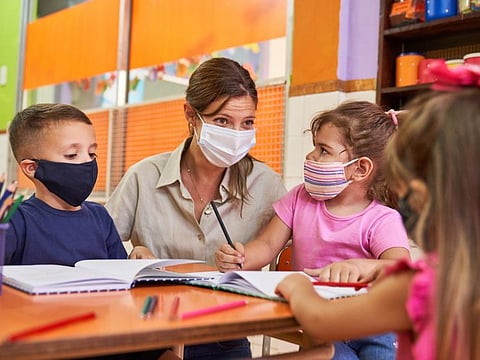New regulations in Abu Dhabi likely to increase number of life support-trained nursery staff
Nurseries can do away with onsite clinics if 10% of staff are trained in life support

Also In This Package
Abu Dhabi: A series of updated health regulations for Abu Dhabi nurseries is likely to increase the number of life support-trained educators working with young children in the emirate, nursery operators have said.
In fact, early years facilities will be able to re-allocate any manpower capacity freed by this decision for direct-to-child roles, they added.
“So far, we have always had to have a licensed nurse on the ground during operational hours. Now, we can ensure that our educators are themselves better trained to handle children’s basic health concerns. This is a win-win for parents too, who can be reassured that the people working directly with their children are qualified to immediately spot any health-related concerns,” Lama Chivi, chief executive officer for Babilou Group in Middle East and India.
Updated licensing rules
Abu Dhabi emirate’s health-care regulator, the Department of Health (DoH), recently refreshed licensing procedures for nurseries in the emirate, allowing these facilities a choice of either operating onsite clinics at nurseries, or training a certain proportion of staff in lifesaving care. Specifically, nurseries can still register a nursery-based clinic as part of their licensing applications, with the clinic operated by a school nurse, registered nurse, nurse practitioner, physician assistant, paramedic or general practitioner. Alternatively, the nursery can ensure that at least 10 per cent of staff hold valid Basic Life Support (BLS) certification or Paediatric Advanced Life Support (PALS) certification from an accredited international provider.
Licensing procedures for nurseries
“We work side by side with our partners in the education sector to identify their needs, and recognise possible ways to enhance health-care licensing procedures for schools and nurseries. In light of what the world has witnessed as a result of the COVID-19 pandemic, we have worked keenly on updating and facilitating our health-care professionals’ licensing procedures for nurseries by providing multiple requirement options that match the nurseries’ needs and capabilities. In this way, we are able to achieve the highest standards of compliance with the stipulated procedures, which will reflect positively on children’s health and safety,” said Hind Al Zaabi, DoH executive director of healthcare facilities sector.
Less closures
Nursery operators say the initiative will ensure that facilities are able to function without frequent closures.

‘’Falcon British Nursery is supportive of the new DoH nursing initiative for early years sector. Previously, even though all our staff underwent basic life support training, if the DoH clinic nurse was absent, the nursery as a whole was not allowed to function. This was particularly difficult during the COVID-19 crisis due to the ensuing costs…We are fortunate to have a government that responds to these issues appropriately and adjusts the criteria to support the industry,” said Emilia Brown, representative of Falcon British Nursery.
Chivi, on the other hand, explained that health professionals in the early years institutions have always first consulted with parents before treating children or administering any interventions.
‘Routine procedures’
“We always have the staff call the parents, and this will continue being regular practice. What’s more, the school nurse was mostly carrying out routine procedures like checking the children’s temperature, following up on their overall health, or educating parents on health. This can now be carried out by our trained educators. We fully expect to train all our staff in life support procedures, and hope regulators in other emirates will follow suit in implementing similar regulations,” Chivi said. The Babilou Group currently operates eight nurseries in Abu Dhabi, and a total of 23 facilities across the UAE.

Support training initiative
The DoH regulations followed a near six-month closure for nurseries across the UAE amid the COVID-19 outbreak. Even after they were allowed to reopen, nurseries have had to follow strict COVID-19 precautionary measures. For instance, until July 1, nurseries in Abu Dhabi had to close for 10 days if a single COVID-19 case was identified, and children were grouped into eight-to 10-person bubbles.
Cynthia Darwish, 34, an independent consultant from Lebanon, was happy when the nurseries reopened with COVID-19 preventive measures in October.
“My younger son attends a nursery, and I have experienced nothing but the most careful care towards his needs. Once, when he had an insect bite on his legs, his teacher performed a full check to ensure that there were no other bites while also informing me to come and pick him up,” she said.
“If the new regulations mean that more educators will be trained in such a manner, it will definitely be a positive step. However, I will discuss any changes with the nursery,” she said.
Dedicated nurse
“We are very positive and supportive of such a decision, knowing that within the early childhood sector in other developed countries, there is no dedicated nurse for each nursery. Instead, each teacher is trained to a high standard to handle all health and safety tasks. Health and safety is our top priority. We welcome the new rules as we would benefit from the opportunity to certify more than 10 per cent of our staff with the [health and safety training],” said Kerryn Michna, a representative from Redwood Nursery, part of the Kids First Group (KFG) network.
Sign up for the Daily Briefing
Get the latest news and updates straight to your inbox








